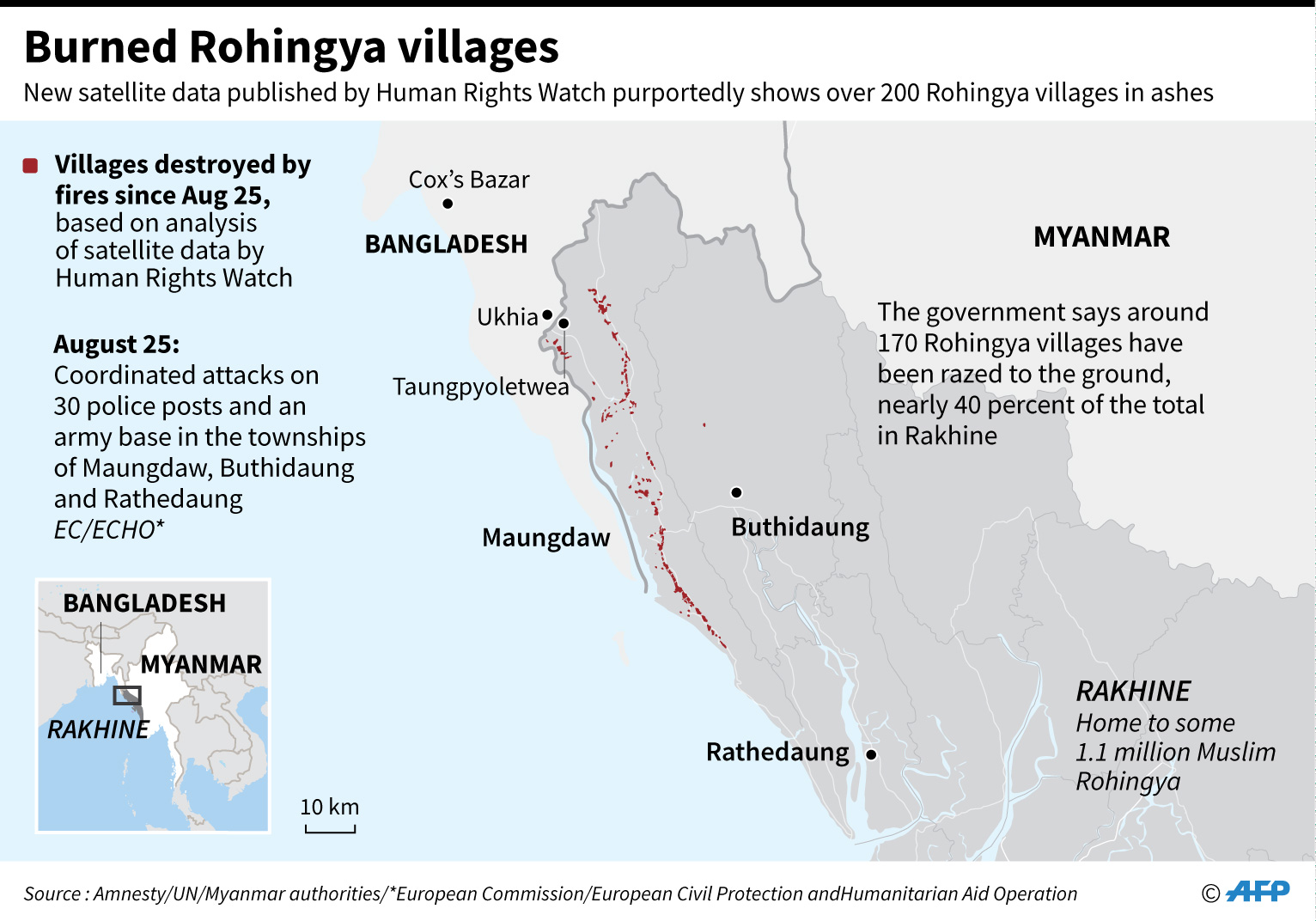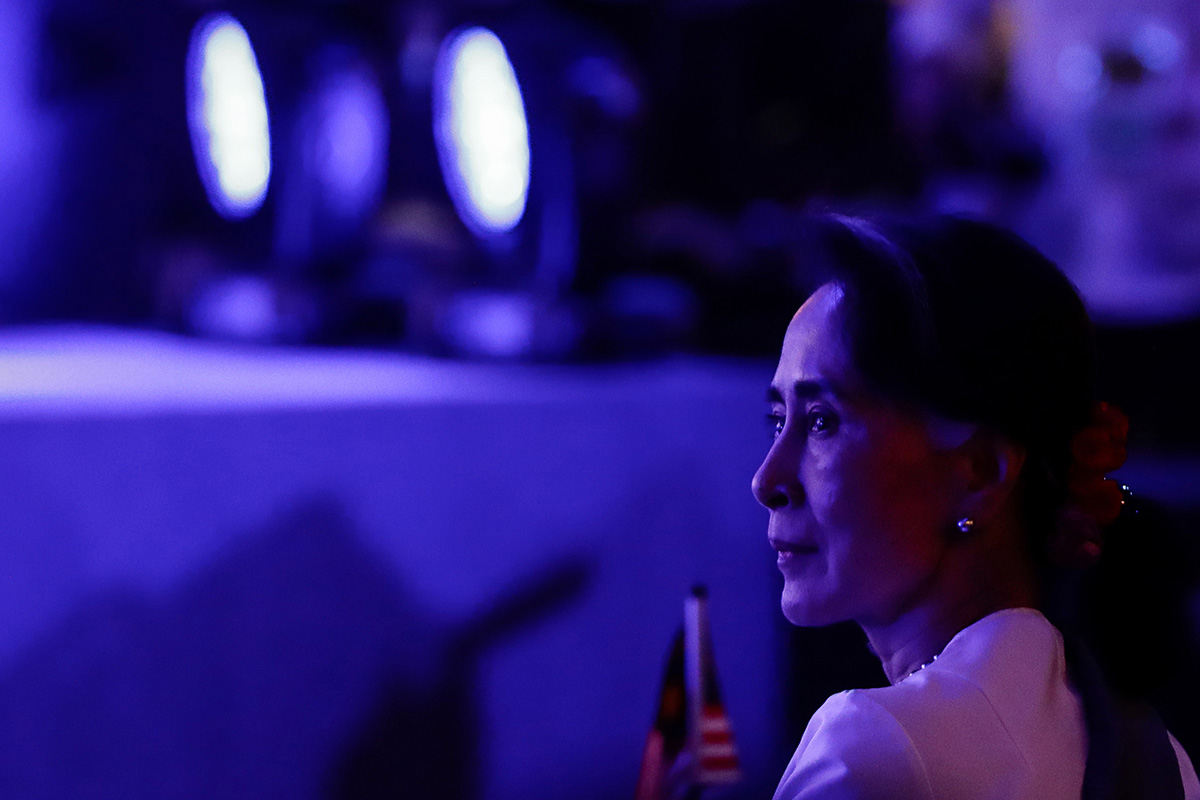Once touted as an icon of democracy, Nobel Peace Prize laureate, Aung San Suu Kyi – who is now the State Counsellor for Myanmar – has had her name dragged through the mud due to criticisms of her poor response to the humanitarian crisis unfolding in the northern Rakhine State in Myanmar.
After keeping mum over the recent spate of attacks on stateless minority Muslims in her country, she finally broke her silence in a televised broadcast and invited the international community to aid her in finding a solution to the trouble. She also confirmed that a timeline for a national verification process to repatriate the stateless refugees is underway and that her government is “prepared to start the verification process at any time.”
Her address also came amidst criticisms of her absence at the UNGA (United Nations General Assembly) in New York but this did not mean world leaders were hesitant on weighing in on the crisis.
The strongest reaction came from French President, Emanuel Macron who condemned the “unacceptable ethnic cleansing” and declared that he would push for actions to be taken by the UNSC (United Nations Security Council) to seek an end to the violence.
Other world leaders like Nigerian President Muhammadu Buhari and Turkish President Recep Tayyip Erdogan also censured the anti-Muslim campaign in their speeches.
Secretary-General of the UN (United Nations) Antonio Guterres echoed a sentiment felt by many, that the ongoing oppression must cease and the grievances faced by the Rohingya, adequately addressed.
“The authorities in Myanmar must end the military operations, allow unhindered humanitarian access, and recognise the right of refugees to return in safety and dignity,” he said.
Elsewhere, Amnesty International’s Regional Director for Southeast Asia and the Pacific, James Gomez, slammed Suu Kyi’s speech as amounting “to little more than a mix of untruths and victim blaming.”
Others acknowledged her speech as a step in the right direction for the infant democracy.
UN (United Nations) Representative in Myanmar, Andrew Kirkwood welcomed the notion that diplomats could visit the affected areas and see for themselves the extent of the situation.
A European Union spokesperson has also echoed the sentiment, adding that Suu Kyi’s administration must demonstrate the “democracy they fought so hard for can work for all the people of Myanmar, beyond ethnic, social and religious boundaries.”
Chinese ambassador to Myanmar, Hong Lian reiterated Beijing’s support for the Myanmar government’s efforts to restore stability in the conflict area.

Map of Myanmar's Rakhine State showing areas where fires were detected by satellites, according to Human Rights Watch. (AFP)
The crisis in Rohingya – which has very recently made headlines the world over – is a festering problem faced by the Myanmar people for decades, rooted deeply in the history of the former junta state. At the crux of the problem is the 1982 Burmese Citizenship Act which has systematically disenfranchised the Muslims living of the Rakhine State.
When contacted by The ASEAN Post, President of the UK based Burmese Rohingya Organisation, Tun Khin said that first and foremost, the 1982 law must be amended or reformed. Suu Kyi’s national verification process is insufficient to ensure a resolution of the crisis.
“We want full citizenship to be granted to the Rohingya not the national verification process as she suggested in her speech. If she doesn’t reform the law, the problem will continue to persist,” remarked Khin.
Alistair Cook, Research Fellow at the Singapore based Centre for Non-Traditional Security Studies, Nanyang Technological University offered a sobering analysis of the situation developing in Myanmar.
“People need to recognise the limits of Aung San Suu Kyi and understand that if anyone can change the situation, it is the military. Hence, the focus should be on influencing the military,” he said in a telephone interview with The ASEAN Post.
The military controls 25 percent of all seats in the Myanmar parliament while holding key ministerial offices within the government and according to Cook, that situation is highly unlikely to change.
For any change to occur in this regard, it would require a constitutional amendment and a 75 percent majority of the house. An attempt was made in 2015 to remove the military’s legislative veto but it failed.
Reacting to the junta’s continued hold on the reins of governance, both Khin and Cook stated that Suu Kyi still has the power to make a change.
“She may not have control over the junta army but she must tell the world the truth. She is not being truthful about the situation in the Rakhine State,” Khin stated.
Moving forward, Cook remarked that crisis will continue to define Myanmar’s international relations and standing within the international community for some time ahead.
Suu Kyi is currently stuck between a rock and a hard place – having to improve Myanmar's tattered image in light of this humanitarian crisis, given the tough position she is in within her government. She undoubtedly has her work cut out and while her speech may have bought her some breathing space, time is not on her side – or the Rohingya’s for that matter. The world is watching, waiting for her next move.
